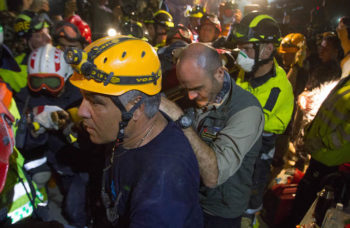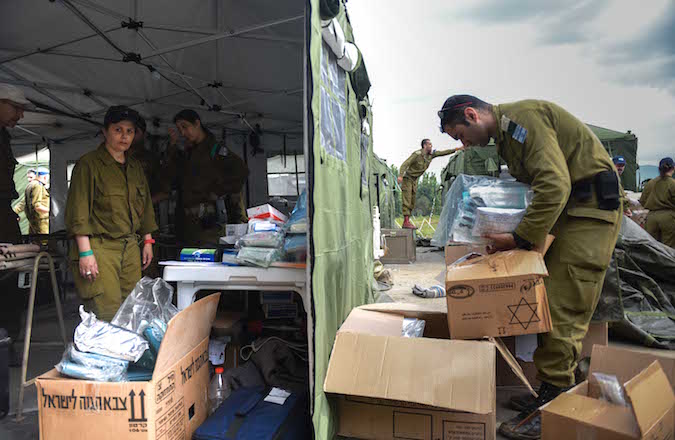NEW YORK (JTA) – Almost as soon as news of Nepal’s devastating earthquake reached the wider world, Jewish aid groups began mobilizing humanitarian efforts to help the victims.
In Israel, that meant dispatching first responders to Nepal; in America, it mostly meant raising and allocating money.
How is the Jewish aid being deployed in Nepal?
Israel
The biggest Jewish on-the-ground response has come from the Jewish state, which currently has more than 260 Israeli soldiers, doctors and rescue experts working in the disaster zone — the largest of all the international aid teams on the ground, according to the Israeli Consulate in New York. The 170-person Israeli Defense Forces delegation has been helping with search-and-rescue operations and setting up field hospitals consisting of two operating rooms, four intensive-care rooms, 80 beds and neonatal care.
Magen David Adom, Israel’s version of the Red Cross, also sent a group of doctors, paramedics and medical supplies to the country, and rescue and recovery workers from ZAKA and United Hatzalah are in Nepal. The Israeli nonprofit Tevel b’Tzedek, which has had a presence in Nepal for eight years, is helping to provide emergency shelter relief and meet other urgent needs.
IsraAid, a 14-year-old Israeli nonprofit that focuses on disaster relief work, made headlines on Thursday when its workers helped lead an international aid effort to rescue a woman in her 20s who had been buried in debris since the earthquake hit five days earlier.
Some of the Israeli groups receive American Jewish support – IsraAid, for example, is funded by a few North American Jewish federations, the American Jewish Committee and B’nai B’rith International — but most of the American Jewish money dedicated to Nepal is not going through Israeli groups.

An Israeli team in the process of rescuing Krishna Devi Khadka, a young woman in her late 20s who was stuck in a hotel for five days in an air pocket covered by a body. (Mickey Noam Alon/IsraAID)
Jewish Federations of North America
The federation umbrella organization, based in New York, is the central address for the fundraising efforts of individual Jewish federations around North America (donors also can give to the umbrella group directly). Since the Nepal quake, non-federation Jewish institutions such as the Orthodox Union also have appealed to constituents to make Nepal relief donations through the Jewish Federations.
Most of the money raised for humanitarian aid goes to the Jewish Federations’ overseas partner organization, the JDC. Totals raised from federations for other recent major disasters overseas included $1 million after the Philippines was struck by Typhoon Haiyan in 2013, $1 million after the 2011 Japanese earthquake and tsunami, $5 million after the 2010 Haiti earthquake and $10 million for the 2004 Indian Ocean tsunami.
American Jewish Joint Distribution Committee (JDC)
The JDC collects money for special disaster relief appeals from North American federations and individual donors and foundations, and spends it on a variety of needs ranging from the immediate to the long term.
After the Nepal earthquake hit, JDC, which did not have a presence in the country, sent some medical equipment to the IDF field hospital that departed for Nepal on Monday morning, including two neonatal incubators. The JDC also sent funds to Magen David Adom to assist the Nepalese Red Cross, to UNICEF to provide emergency supplies for children including water and sanitary materials, and to Tevel B’tzedek to assist with providing shelter.
Meanwhile, the JDC dispatched several staffers to Nepal, including a disaster relief expert who is also a field medic, JDC’s India country director and others with experience in disaster relief and work in the developing world.
Typically, JDC disaster relief efforts last for years. For example, of the $2.7 million JDC raised for Philippines relief, as of last September $1.5 million of it had been allocated along the following lines: 34 percent on emergency response and relief, 25 percent on restoring jobs and livelihoods, 15 percent on disaster risk reduction programs, 14 percent on rebuilding schools, 11 percent on psychosocial support and post-trauma care and 1 percent on public health initiatives.
JDC’s disaster relief efforts included $2.8 million after the Japanese earthquake, $8.8 million after the Haiti earthquake and $19.6 million after the Indian Ocean tsunami.
The JDC also coordinates the Jewish Coalition for Disaster Relief, a collection of 49 Jewish agencies that have raised funds for various disasters and in some cases have implemented their own disaster relief programs.
American Jewish World Service (AJWS)
AJWS works in six countries in Asia, but not Nepal. Following this week’s earthquake, however, the organization sprung into action, raising $800,000 for Nepal disaster relief in just five days and beginning to distribute the funds to local recipient organizations. AJWS’s focus is on rural communities, minorities, women and gays.
To that end, the first round of AJWS grants to Nepal are going to a group providing medical support and earthquake relief to HIV-positive LGBT people; an organization that provides free and low-cost medical care to Nepal’s most destitute; a group that focuses on health care, education and employment for poor communities in remote mountain villages; and a women’s rights organization providing pregnant mothers with shelter and other basic necessities. AJWS is also supporting International Medical Corps’ work providing earthquake survivors with first aid and psychosocial support.
AJWS became a major Jewish aid organization after the 2004 Indian Ocean tsunami, for which it collected nearly $11 million. It also collected $6.6 million after the Haiti earthquake, $1 million after the Philippines typhoon and over $1 million for Ebola relief. Some of AJWS’s money has come from the Jewish Federations.
Chabad
With outposts around the world, Chabad emissaries often are the first Jews to respond in person to disasters in far-flung places. After the earthquake struck Nepal, Rabbi Chezky Lifshitz of Chabad of Nepal began bringing hygiene supplies, hot meals, fresh water and fruit to clusters of Nepalese citizens whose homes had turned to rubble, distributing some 2,000 meals per day, according to Chabad. The rabbi also borrowed a helicopter to hitch a ride to the mountainous region of Dhunche on Wednesday, where some 25 Israeli hikers were stranded and later were airlifted out. The hikers will be sheltered in the Chabad house, which has turned into a crisis hub according to Chabad. The movement is also collecting funds for Nepal earthquake relief.
JTA has documented Jewish history in real-time for over a century. Keep our journalism strong by joining us in supporting independent, award-winning reporting.






